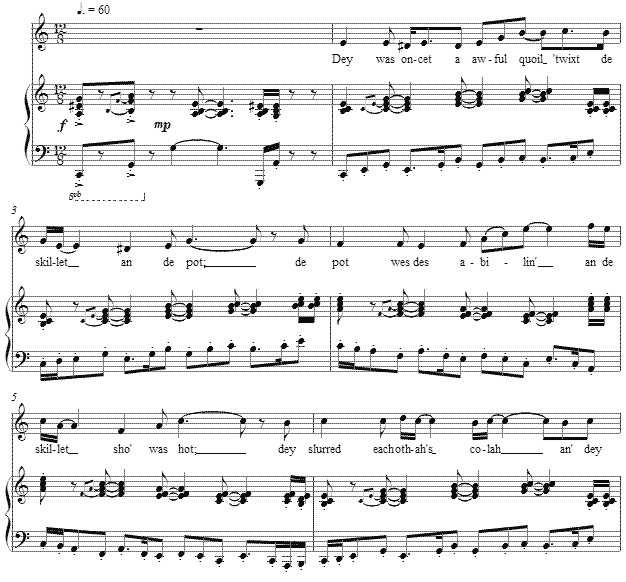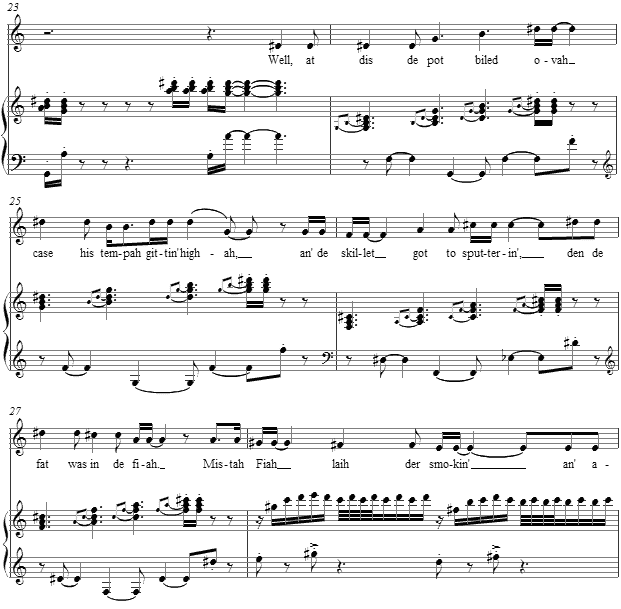Music and Texts of GARY BACHLUND
Vocal Music | Piano | Organ | Chamber Music | Orchestral | Articles and Commentary | Poems and Stories | Miscellany | FAQs
Trouble in de Kitchen - (2009)
Paul Laurence Dunbar
for medium voice and piano
Dey was oncet a awful quoil ‘twixt de skillet an’ de pot;
De pot was des a-bilin’ an’ de skillet sho’ was hot.
Dey slurred each othah’s colah an’ dey called each othah names,
W’ile de coal-oil can des gu-gled, po’in oil erpon de flames.
De pot, hit called de skillet des a flat, disfigured t’ing,
An’ de skillet ‘plied dat all de pot could do was set an’ sing,
An’ he ‘lowed dat dey was ‘lusions dat he wouldn’t stoop to mek
‘Case he reckernize his juty, an’ he had too much at steak.
Well, at dis de pot biled ovah, case his tempah gittin’ highah,
An’ de skillet got to sputterin’, den de fat was in de fiah.
Mistah fiah lay daih smokin’ an’ a-t’inkin’ to hisse’f,
W’ile de peppah-box us nudgin’ of de gingah on de she’f.
Den dey all des lef’ hit to ‘im, ‘bout de trouble an’ de talk;
An’ howevah he decided, w’y dey bofe ‘u’d walk de chalk;
But de fiah uz so ‘sgusted how dey quoil an’ dey shout
Dat he cooled ‘em off, I reckon, w’en he puffed an’ des went out.[ 6 pages, circa 3' 10" ]
Paul Laurence Dunbar
The text was first published in Dunbar's collection, Lyrics of Sunshine and Shadow, The Century Company, Copyright 1901. This company was a subsidiary of Charles Scribner and Sons, and also published a magazine. Dunbar's often humorous side was written in dialect, and this enlarging of the expression "the pot calling the kettle black" builds it into scene with pot and the skillet, the coal oil can and "Mistah Fiah," the fire itself. The end of the tale extinguishes the argument, the fire disgusted with the quarrel -- or "quoil." I shall leave it to the performers to further clarify this marvelous use of language.
The rollicking 12/8 meter underpins the vocal line's jaunty rhythms, as the bass line dances up the tonic major seven chord and then back down the subdominant major seven, the dominant reserved for only a curtain between the verses. The form is a modified AA'BA, to underpin the scansion of the text.
The B section for the third stanza of the poem breaks from the major tonality by slipping into an augmented subtonic seven chord, and the slips chromatically thereafter passing regions quite remote from the tonic. The last verse revisits, reprising the first with a short codetta.
The score for Trouble in de Kitchen is available as a free PDF download, though any major commercial performance or recording of the work is prohibited without prior arrangement with the composer. Click on the graphic below for this piano-vocal score.


